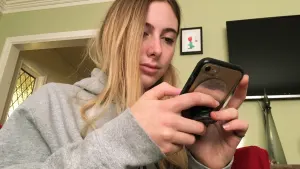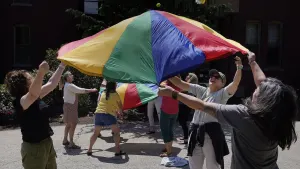More Stories
News 12's Elizabeth Hashagen was joined by Dr. Sharon Nachman this morning. Dr. Nachman is the head of pediatric infectious diseases at Stony Brook Children's Hospital, and director of the office of clinical trials.
Regeneron announced this morning that its antibody drug cocktail prevented 100% of symptomatic COVID-19 infections in its trials. It also appeared that infections in volunteers who received the antibody were less severe than those who did not.
The results represent the first 400 volunteers from the study, which is being run by the National Institute of Allergy and Infectious Diseases (NIAID), and is continuing to enroll patients. The volunteers were at high risk of infection because they lived in the same household as a COVID-19 patient. Half the patients received a placebo, and the other half received 1.2 grams of casirivimab and imdevimab, Regeneron's antibodies.
While eight of the 223 patients in the placebo group developed COVID-19 symptoms, and tested positive for the virus, none of the 186 patients who received the antibody did. Dr. Nachman weighs in on the study:
Moderna and Pfizer now acknowledge that their vaccines might require alterations and boosters to fend off new and future variants of the virus.
The British variant had no effect on the levels of neutralizing antibodies, the type that can disable the virus, produced after vaccination. But with the South African form, there was a six fold reduction in those levels. Even so, Moderna said, those antibodies "remain above levels that are expected to be protective."
Nevertheless, Moderna has already begun developing a new form of the vaccine, that could be used as a booster against the South African variant. Dr. Nachman answers how the vaccines work with the new variants:
Pfizer has fully enrolled its COVID-19 vaccine trial in children ages 12 to 15. It's a key step before the vaccine could be used in younger age groups.
Enrollment in Moderna's adolescent trial got off to a slower start than hoped. We know people ages 16 and older in December got emergency use authorization. Trials in younger age groups are necessary to ensure the correct dose, as well as safety and efficacy in those different groups.
Pfizer declined to say when it expected results from the trial, which are dependent on the rate of infections observed to be able to compare the rates in the placebo group to those receiving the vaccine.
Dr. Nachman weighs in on Merck stopping developing both of its COVID-19 vaccine candidates.
More from News 12
1:28

5 simple steps for long-term benefits to your health and heart
1:32

8 tips for working safely during hot weather
3:31

Guide: Ways to set your child up for financial success
3:18

Guide: The importance of good sleep and how to get it

Guide: Mental health resources available in the tri-state
9:36
